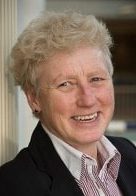 Trisha Greenhalgh is professor of primary care at the University of Oxford. She is on Twitter
Trisha Greenhalgh is professor of primary care at the University of Oxford. She is on Twitter
This book, by a US-trained medical doctor, argues that epidemiologists and other doctors who announced, early in the pandemic, that natural covid-19 infection was a good thing (because it would build up herd immunity in the population) are in part responsible for the emergence of anti-vax positions among prominent doctors, and this in turn is causing untold harm as more and more people choose to go unvaccinated.1
The book takes its title from a statement made in June 2020 by Paul Alexander, a professor of epidemiology who worked in the US Department of Health and Human Sciences. Prof Alexander was talking about children and teenagers. Received wisdom at the time (many months before vaccines became available) was that the younger the patient infected with SARS-CoV-2, the milder the disease and the lower the risk of complications. Hence, a key strategy for protecting the old and vulnerable, he reasoned, could be to ensure that all or most healthy children and young people encountered covid-19 as a natural infection.
The herd immunity hypothesis enjoyed a brief period of credibility among mainstream scientists, including the UK’s Chief Scientific Officer…
The herd immunity hypothesis enjoyed a brief period of credibility among mainstream scientists, including the UK’s Chief Scientific Officer (Sir Patrick Vallance),2 in early 2020 but was quickly shown to be untenable, for several reasons. Contrary to initial hopes, covid-19 does not produce sterilising immunity (i.e. catching it doesn’t completely stop someone subsequently being reinfected and transmitting the virus to others). In the pre-vaccine era, encouraging infection to spread through the population (‘let it rip’) would inevitably produce some casualties, especially among clinically vulnerable people, leading critics to brand this a ‘eugenics’ strategy. Even if an acute covid-19 illness is mild, and especially if it is not, its sequelae may be prolonged and life-changing. Very occasionally, children have died or become disabled from covid-19. Vaccines produce high levels of immunity in most people with few or no side effects, making them safer by orders of magnitude than natural infection in an unvaccinated individual.
For all these reasons, most scientists and doctors came to reject the herd immunity hypothesis by late 2020 or early 2021. They supported public health advice to people to try to avoid catching and transmitting covid-19 (using measures such as masking, testing, contact-tracing and quarantining) and to get vaccinated unless they had contra-indications. But a handful of doctors, some of whom were affiliated with leading universities, read the scientific evidence through what might be called a libertarian prism. They continued to view herd immunity by natural infection as a credible scientific strategy, and they were unconvinced by the evidence base on public health protections.
Issues which have implications for our rights and freedoms tend to cause polarisation among scientists, since the latter are not immune to their own personal beliefs and values. The body of evidence around public health measures for stopping a pandemic in its tracks is ambiguous and contested. That some medical scientists depict such measures as ‘restrictions’ [of people’s freedom] rather than ‘protections’ [against viral transmission] is hardly surprising. That these doctors quickly found themselves in demand as ‘advisers’ to libertarian politicians is even less surprising.
But being on one pole of a restrictions-versus-protections continuum is a long way from swallowing undiluted anti-vax Kool-Aid, isn’t it? Covid-19 vaccines were quickly shown in randomised controlled trials to be effective and safe in people without explicit contra-indications; serious and extremely rare side effects were outweighed by the more serious and commoner effects of the disease itself. Surely, being lukewarm on masking doesn’t mean you’re going to deny the evidence on vaccines?
In this book, Howard shows that for some (though mercifully, not all) libertarian-leaning doctors, this is precisely the elision that occurred. Professor Alexander himself, once a leading adviser to government, came to express increasingly extreme anti-vax views, describing mRNA vaccines as “bioweapons” and leading a movement for patients to “demand vaccine-free blood” if they ever needed a transfusion. He also, according to Howard, asked people to send him money for his covid-19 “research”.
Howard exhaustively documents statements made in the mainstream media and academic journals by a handful of other doctors (“the Disinformation Dozen”), many of whom became household names in the media. These individuals, he argues, shockingly minimised the benefits and overplayed the risks of covid-19 vaccines, especially in children. He believes that some of these doctors undertook or supported scientifically questionable research, and alludes to financial conflicts of interest—particularly paid consultancies—that may have influenced their judgement.
Howard is particularly critical of certain ivory-tower academics who, whilst medically qualified, undertook little empirical research and rarely saw patients but spent their time doing systematic reviews and meta-analyses of research done by others. One or two of these evidence-based medicine ‘gurus’, he points out, made spectacularly inaccurate predictions (e.g. that covid-19 was a cold-like illness which would quickly burn itself out). Howard suggests that what led them to under-estimate the deadly potential of this disease by orders of magnitude (and hence downplay the need for vaccines) was their absence from the clinical front line.
Do we need theory to explain why doctors occasionally join crazy social movements?
I didn’t read every word of this 600-page book, most of which relates to the claims of US medical scientists and their entanglements with right-wing politicians up to and including President Trump. Whilst I enjoyed the book and broadly share the author’s position on many key points (e.g. that doctors who should have known better misread the evidence and contributed to a delay in vaccinating children and adolescents which risked precious young lives),3 I found it over-long, rambling in places, and under-theorised (that is, it lists some alleged bad things that happened but doesn’t venture a scholarly explanation of why they happened).
Do we need theory to explain why doctors occasionally join crazy social movements? Absolutely we do, if we want to convert our outrage to generalisable insights about how to deal with (and prevent) this phenomenon. Try this succinct chapter by Hungarian sociologist Lili Turza.4 She meticulously describes the emergence of doctors and allied professionals as “conspiracy entrepreneurs”—self-styled medical celebrities who built large followings on social media, organised themselves into branded movements (“Doctors for Clarity”), mobilised and gave credibility to anti-vax discourses (including the view that covid-19 vaccines had been developed for profit by “Big Pharma” with scant regard for safety), organised public protests, helped align disparate groups opposed to masks, lockdowns and border closures with the growing anti-vax and alternative medicine movements, and tapped into the “conspiracist populism” (not to mention the nationalism and antisemitism) of Hungary’s then Prime Minster, Viktor Orbán.
In sum, if you just want to read hundreds of shocking things that a few doctors said and did which contributed to the growing problem of anti-vax movements in USA, ‘We want them infected’ could meet your needs. But if you’d like to explore the role of medical scientists in anti-vax conspiracy movements at a more academic level, you may find Turza’s case study from Hungary more informative. Actually, I’d recommend both.
Featured book: Howard J. “We want them infected”—How the failed quest for herd immunity led doctors to embrace the anti-vaccine movement and blinded Americans to the threat of COVID. Rewhawk Publications 2023.
References
- Howard J. “We want them infected”—How the failed quest for herd immunity led doctors to embrace the anti-vaccine movement and blinded Americans to the threat of COVID. Rewhawk Publications 2023.
- Stewart H, Busby M. Coronavirus: science chief defends UK plan from criticism. Guardian, 13th March 2020. Accessed 18.8.23 at https://www.theguardian.com/world/2020/mar/13/coronavirus-science-chief-defends-uk-measures-criticism-herd-immunity
- Gurdasani D, Bhatt S, Costello A, Denaxas S, Flaxman S, Greenhalgh T, Griffin S, Hyde Z, Katzourakis A, McKee M, Michie S. Vaccinating adolescents against SARS-CoV-2 in England: a risk–benefit analysis. Journal of the Royal Society of Medicine. 2021 Nov;114(11):513-24.
- Turza L. Conspiracy entrepreneurs, fringe movements, and the pervasive style of conspiracy during the coronavirus pandemic. In Butter M, Knight P (eds). Covid Conspiracy Theories in Global Perspective. London, Routledge, 2023:221-235.
Featured photo by Daniel Schludi on Unsplash







The review does a good job of presenting the book’s content and the author’s position on the topic. You acknowledge its strengths in addressing the book’s main argument, which discusses the responsibility of certain doctors and epidemiologists in the emergence of anti-vax positions and the harm caused by the resulting increase in unvaccinated individuals, but also pointing out its weaknesses, such as being over-long, rambling, and lacking theoretical explanations for the phenomenon discussed.
Overall, this review is well-written, providing a concise and informative summary of the book while critically engaging with its content.